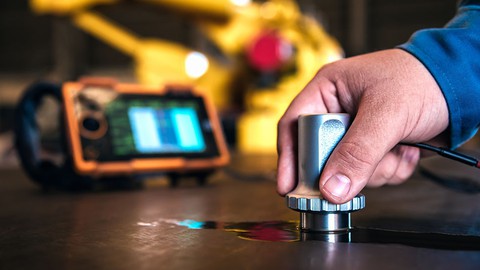
Non Destructive Testing Methods (NDT Process)
Non Destructive Testing Methods (NDT Process), available at $49.99, has an average rating of 4.56, with 17 lectures, 7 quizzes, based on 318 reviews, and has 3708 subscribers.
You will learn about General process engineering and quality guidelines for the use of NDT Visual Testing and Advantages & Disadvantages Die Penetrant Testing and Advantages & Disadvantages Magnetic Particle Testing and Advantages & Disadvantages Eddy Current Testing and Advantages & Disadvantages Ultrasonic Testing and Advantages & Disadvantages Radiography Testing and Advantages & Disadvantages Acoustic Emission and Advantages & Disadvantages Leak Testing, Vibration Analysis Non Destructive Testings of metals, machines and components How to select the best NDT methods for your application Personnel certification This course is ideal for individuals who are Material science or Inspection quality engineers, Mechanical Engineering, Civil, Chemical, Aerospace, Medical students, Any one who want to learn and get job in NDT Field or Students who are Curious about Non Destructive Testing or All people interested in material inspection or Students studying material examination, quality control or welding technology or Quality control people in the manufacturing industry dealing with metal fabrication or Oil and Gas Professionals Non-Destructive Testing Engineers Mechanical Engineers Quality Assurance Engineers or Non-Destructive Testing Engineers or Mechanical Engineers Quality Assurance Engineers It is particularly useful for Material science or Inspection quality engineers, Mechanical Engineering, Civil, Chemical, Aerospace, Medical students, Any one who want to learn and get job in NDT Field or Students who are Curious about Non Destructive Testing or All people interested in material inspection or Students studying material examination, quality control or welding technology or Quality control people in the manufacturing industry dealing with metal fabrication or Oil and Gas Professionals Non-Destructive Testing Engineers Mechanical Engineers Quality Assurance Engineers or Non-Destructive Testing Engineers or Mechanical Engineers Quality Assurance Engineers.
Enroll now: Non Destructive Testing Methods (NDT Process)
Summary
Title: Non Destructive Testing Methods (NDT Process)
Price: $49.99
Average Rating: 4.56
Number of Lectures: 17
Number of Quizzes: 7
Number of Published Lectures: 17
Number of Published Quizzes: 7
Number of Curriculum Items: 30
Number of Published Curriculum Objects: 30
Original Price: $22.99
Quality Status: approved
Status: Live
What You Will Learn
- General process engineering and quality guidelines for the use of NDT
- Visual Testing and Advantages & Disadvantages
- Die Penetrant Testing and Advantages & Disadvantages
- Magnetic Particle Testing and Advantages & Disadvantages
- Eddy Current Testing and Advantages & Disadvantages
- Ultrasonic Testing and Advantages & Disadvantages
- Radiography Testing and Advantages & Disadvantages
- Acoustic Emission and Advantages & Disadvantages
- Leak Testing, Vibration Analysis
- Non Destructive Testings of metals, machines and components
- How to select the best NDT methods for your application
- Personnel certification
Who Should Attend
- Material science or Inspection quality engineers, Mechanical Engineering, Civil, Chemical, Aerospace, Medical students, Any one who want to learn and get job in NDT Field
- Students who are Curious about Non Destructive Testing
- All people interested in material inspection
- Students studying material examination, quality control or welding technology
- Quality control people in the manufacturing industry dealing with metal fabrication
- Oil and Gas Professionals Non-Destructive Testing Engineers Mechanical Engineers Quality Assurance Engineers
- Non-Destructive Testing Engineers
- Mechanical Engineers Quality Assurance Engineers
Target Audiences
- Material science or Inspection quality engineers, Mechanical Engineering, Civil, Chemical, Aerospace, Medical students, Any one who want to learn and get job in NDT Field
- Students who are Curious about Non Destructive Testing
- All people interested in material inspection
- Students studying material examination, quality control or welding technology
- Quality control people in the manufacturing industry dealing with metal fabrication
- Oil and Gas Professionals Non-Destructive Testing Engineers Mechanical Engineers Quality Assurance Engineers
- Non-Destructive Testing Engineers
- Mechanical Engineers Quality Assurance Engineers
Are you looking to learn NDT Methods and boost your career?
Do you want to have a career in mechanical engineering with the fastest career growth?
Do you want a career with tons of job opportunities?
Well, we have a solution for you.
Our Non-Destructive Testingcourse comes with a blended package of theoretical and practical learning.
The topics are sorted in accordance with the demand in the industries.
NDT engineers are in extremely high demand in various engineering fields such as Marine, Oil and gas, Petrochemical, Power, Aircraft, Automobile, Manufacturing, and so on.
NDT engineers are responsible for carrying out the inspection and testing of machinery, thereby reducing losses to companies and ensuring the utmost safety of workplaces.
Our NDT course is directly focused on industrial skills needed in the current workplace.
Once you complete the NDT course, you shall have lots of job opportunities in any country of the world.
Non-destructive testing (NDT) is the process of inspecting, testing, or evaluating materials, components or assemblies for discontinuities, or differences in characteristics without destroying the serviceability of the part or system. In other words, when the inspection or test is completed the part can still be used.
In contrast to NDT, other tests are destructive in nature and are therefore done on a limited number of samples (“lot sampling”), rather than on the materials, components or assemblies actually being put into service.
These destructive tests are often used to determine the physical properties of materials such as impact resistance, ductility, yield and ultimate tensile strength, fracture toughness and fatigue strength, but discontinuities and differences in material characteristics are more effectively found by NDT.
Today modern nondestructive tests are used in manufacturing, fabrication and in-service inspections to ensure product integrity and reliability, to control manufacturing processes, lower production costs and to maintain a uniform quality level. During construction, NDT is used to ensure the quality of materials and joining processes during the fabrication and erection phases, and in-service NDT inspections are used to ensure that the products in use continue to have the integrity necessary to ensure their usefulness and the safety of the public.
Music by Joystock
Course Curriculum
Chapter 1: Introduction
Lecture 1: Course Introduction
Lecture 2: What is NDT & Why to Learn it ?
Chapter 2: Visual Testing Methods
Lecture 1: Visual testing
Lecture 2: Advantages & Disadvantages of Visual Testing
Chapter 3: Dye or Liquid Penetrate Testing
Lecture 1: Dye Penetrant or Liquid Penetrant Method
Lecture 2: Advantages & Disadvantages of DPT
Chapter 4: Magnetic Partical Testings
Lecture 1: Magnetic Particle Testing Method
Lecture 2: Advantages & Disadvantages of MPT
Chapter 5: Ultrasonic Testing
Lecture 1: Ultrasonic Testing
Lecture 2: Advantages & Disadvantages of Ultrasonic testing
Chapter 6: Eddy Current Testing
Lecture 1: Eddy Current Testing
Lecture 2: Advantages & Disadvantages of eddy Current Testings
Chapter 7: Radiography testing
Lecture 1: Radiography Testing
Lecture 2: Radiography Advantages & Disadvantages
Chapter 8: Acoustic Emission Testing
Lecture 1: Acoustic Emission Testing
Lecture 2: Advantages & Disadvantages of Acoustic Emission Testing
Chapter 9: Leak Testing Method
Lecture 1: Leak Testing Method
Instructors
-
Naman kumar Gandhi
Professor at Indore Institute of Science & Technology
Rating Distribution
- 1 stars: 6 votes
- 2 stars: 8 votes
- 3 stars: 43 votes
- 4 stars: 80 votes
- 5 stars: 181 votes
Frequently Asked Questions
How long do I have access to the course materials?
You can view and review the lecture materials indefinitely, like an on-demand channel.
Can I take my courses with me wherever I go?
Definitely! If you have an internet connection, courses on Udemy are available on any device at any time. If you don’t have an internet connection, some instructors also let their students download course lectures. That’s up to the instructor though, so make sure you get on their good side!
You may also like
- Top 10 Content Creation Courses to Learn in December 2024
- Top 10 Game Development Courses to Learn in December 2024
- Top 10 Software Testing Courses to Learn in December 2024
- Top 10 Big Data Courses to Learn in December 2024
- Top 10 Internet Of Things Courses to Learn in December 2024
- Top 10 Quantum Computing Courses to Learn in December 2024
- Top 10 Cloud Computing Courses to Learn in December 2024
- Top 10 3d Modeling Courses to Learn in December 2024
- Top 10 Mobile App Development Courses to Learn in December 2024
- Top 10 Graphic Design Courses to Learn in December 2024
- Top 10 Videography Courses to Learn in December 2024
- Top 10 Photography Courses to Learn in December 2024
- Top 10 Language Learning Courses to Learn in December 2024
- Top 10 Product Management Courses to Learn in December 2024
- Top 10 Investing Courses to Learn in December 2024
- Top 10 Personal Finance Courses to Learn in December 2024
- Top 10 Health And Wellness Courses to Learn in December 2024
- Top 10 Chatgpt And Ai Tools Courses to Learn in December 2024
- Top 10 Virtual Reality Courses to Learn in December 2024
- Top 10 Augmented Reality Courses to Learn in December 2024






















